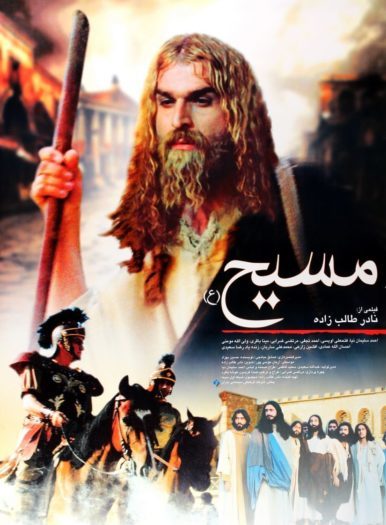 A Jesus movie with a difference: it was filmed in Iran and made from a Muslim perspective. Its source wasn’t the Bible but the Koran and the GOSPEL OF BARNABAS, an Islamic-friendly account of the life of Jesus that was written, allegedly, by the Biblical figure of that name. THE MESSIAH (2007) was one of several mid-to-late ‘00s films made “in response to” Mel Gibson’s enormously controversial PASSION OF THE CHRIST (which THE MESSIAH’S director Nader Talebzadeh called “a well-crafted movie” whose “story is wrong”), and one of the most monumental film productions ever mounted in Iran.
A Jesus movie with a difference: it was filmed in Iran and made from a Muslim perspective. Its source wasn’t the Bible but the Koran and the GOSPEL OF BARNABAS, an Islamic-friendly account of the life of Jesus that was written, allegedly, by the Biblical figure of that name. THE MESSIAH (2007) was one of several mid-to-late ‘00s films made “in response to” Mel Gibson’s enormously controversial PASSION OF THE CHRIST (which THE MESSIAH’S director Nader Talebzadeh called “a well-crafted movie” whose “story is wrong”), and one of the most monumental film productions ever mounted in Iran.
If anything, THE MESSIAH most closely resembles THE PASSOVER PLOT, a 1975 film inspired by the bestselling nonfiction account of the same name that claimed Jesus Christ faked his death on the cross. That film quickly fell into obscurity, and THE MESSIAH, despite winning a prize at an Italian film festival, had a similar reception in the western world–indeed, it was actually considered “lost” for many years.
You know most of the particulars: in Jerusalem 30 AD a renegade prophet known as Jesus of Nazareth is making trouble by stirring up the Jewish populace, much to consternation of the Roman overseers. This entails a flashback montage of Jesus’ life, which is largely identical to the details contained in the New Testament, and introductions to his companions, who include Barnabas (of course) and Judas Iscariot.
We see Jesus perform several miracles, including allowing a deaf woman to hear and bringing multiple dead people back to life (with Lazarus, who according to the Bible was the first person that was so gifted, being the second). We also see the “let he who is without sin throw the first stone” bit in which Jesus protects a prostitute from a ravenous mob, here conjuring a square puddle in which a prospective stone-thrower is forced to gaze upon his reflection, which drives him mad.
Thematically speaking this film, like most other Jesus movies (Gibson’s included), is thoroughly solemn and reverential in its treatment. Where it differs from those other films is in the frequently cloudy and overcast cinematography (as opposed to the lush visuals that mark most Jesus movies), and in Jesus’ oft-repeated proclamation that he is not the son of God and that a messenger named Ahmad (another name for Muhammed, as in, many Muslim scholars claim, the Prophet Muhammed) will come after him–a revelation that causes a mini-riot in the temple of Solomon (in apparent substitution of the cleansing of the temple passage in John 2:13-16).
Another major difference between this and most other Jesus movies occurs in the final twenty minutes, in which we’re given two endings. One is a “continuation of the events according to the Christian narrative,” consisting of Jesus being arrested during the last supper, forced to stand trial, whipped and crucified. The above is presented in the form of a rather perfunctory montage, after which we get the version described by the Koran. This much lengthier ending depicts a divine intervention in which “the wonderful god acted wonderfully” by transforming Judas, who’s just sold out Jesus to the Romans, into the spitting image of the other, resulting in Pontius Pilate condemning Judas to die on the cross, even though Pilate isn’t entirely sure he’s condemning the right guy.
I should add that nearly everyone in this film is dark-haired but for J.C., who as in most contemporary portrayals of the man has long blond hair. The proceedings are, furthermore, extremely fast paced, as they must be in order to fit all the relevant details of Jesus’ life into the accelerated 84 minute runtime. I say it’s too fast, and not helped at all by the overuse of voice-over montages to fill in quite a few major plot points. The material was later re-configured and released as a multi-episode TV miniseries, in which form it’s probably better.
Vital Statistics
THE MESSIAH (MESIH; JESUS, THE SPIRIT OF GOD)
Director: Nader Talebzadeh
Producer: Abdollah Saeedi
Screenplay: Nader Talebzadeh
Cast: Ahmad Soleimani Nia
